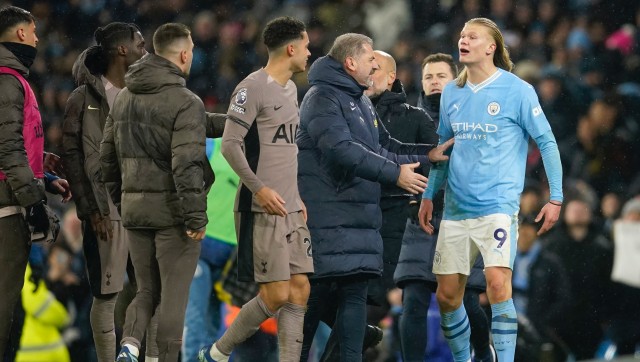Manchester City’s six-goal draw against Tottenham Hotspur on Sunday was marred by controversy in stoppage time after referee Simon Hooper failed to play advantage for what seemed to be a goal-scoring opportunity. What happened in stoppage time? Haaland was fouled by Emerson Royal but quickly got up and played teammate Jack Grealish through on goal. Referee Hooper allowed play to continue briefly before blowing his whistle and brought play back for a free-kick.
— Erling Haaland (@ErlingHaaland) December 3, 2023
Haaland was one of several City players to angrily remonstrate with the official and he continued his protests after the game by reposting a clip of the incident on X, formerly Twitter, with the comment “Wtf”, which is offensive slang. What does the law say? As per International Football Association Board (IFAB), the ruling body behind football’s laws, a referee can signal advantage “by extending one or both arms forward at shoulder height”. The referee should play advantage only if: a) There is a benefit for the non-offending team b) No player is seriously injured c) There is no risk of a reaction or a confrontation More things to consider for a referee if they intend to let play continue: a) Allowing play to continue is not always in the best interests of the non-offending team, e.g. if they are in or near their own penalty area and/or under pressure b) A free kick in an attacking situation may be better for the non-offending team than allowing play to continue” The rules further say: “the referee can wait a few seconds to allow a possible advantage to develop, and if the non-offending team does not benefit and gains no advantage, the original free kick can be given. However, the non-offending team should not be given two chances, for example if a player is fouled but recovers and has a shot at goal; if the player does not score, the referee cannot go back and give a free kick for the original offence”. Could VAR have made a difference? VAR can assist the referee only in the event of a ‘clear and obvious error’ or ‘serious missed incident’. It can pertain to: a) Goal/no goal b) Penalty/no penalty c) Direct red card (not second yellow card/caution) d) Mistaken identity (when the referee cautions or sends off the wrong player of the offending team) Since it didn’t fall into any of the categories, and was an on-field decision, VAr was not able to intervene. How did Man City manager Pep Guardiola react? Club manager Pep Guardiola said he could understand the player’s anger. He wasn’t aware of the player’s social media post when speaking to reporters after the match. “It’s normal,” said the City boss. “His reaction was the same for 10 players. The rules are you cannot talk with the referees or fourth officials, so we should have had 10 players sent off today. “He’s a little bit disappointed. Even the referee – if he played for Man City today he would be disappointed for that action, that’s for sure.” Guardiola, meanwhile, tried to temper his criticism, saying in a TV interview he did not want to make a “Mikel Arteta comment”, in reference to the Arsenal manager’s controversial remarks after a game against Newcastle last month. He added in a press conference: “I make mistakes, the players make mistakes. “It surprised me because in the moment Erling went down (and) if you whistle in that moment it’s fine. “But when he stands up and continues and the referee makes that gesture to play on, and after he (Haaland) makes the pass he then stops the game – I don’t want to criticise him. “On the touchline sometimes I lose my mind and my gestures are not proper but for many years as a manager I’m not a guy, when I’m refreshed, to comment.”


)
)
)
)
)
)
)
)
)



